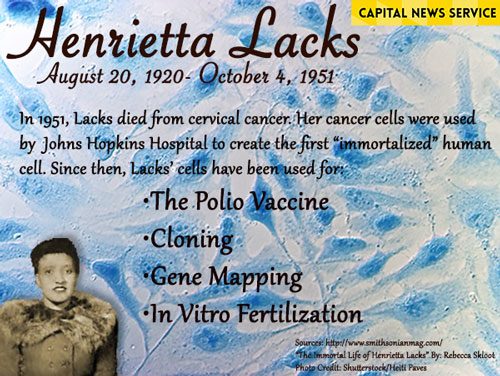WASHINGTON — Maryland Democrats have introduced legislation honoring Henrietta Lacks’ legacy by examining the access underrepresented groups have to government-funded cancer clinical trials.
The Henrietta Lacks Enhancing Cancer Research Act directs the Government Accountability Office to publish a report scrutinizing the entry barriers traditionally underrepresented groups face when trying to participate in clinical trials.
The measure is cosponsored by Maryland Democratic Sens. Chris Van Hollen and Ben Cardin and Democratic Reps. Elijah E. Cummings of Baltimore, Dutch Ruppersberger of Timonium, and John Sarbanes of Towson.
“Henrietta Lacks – and the contribution of her unique cells – have allowed for huge advances in medical research that have saved countless lives,” Van Hollen said in a statement. “In addition to recognizing her story, we also must work to make sure that all people – especially those from often marginalized communities – are represented in cancer trials and ultimately get the treatment they deserve.”
Lacks, an African-American Baltimore native, died of cervical cancer in 1951.
She was treated at the Johns Hopkins Hospital, where doctors sampled her tumor, from which the HeLa line was created. The line was the first set of cells to survive outside the body and played a pivotal role in the development of the polio vaccine and treatments of cancers and HIV/AIDS.
But neither Lacks nor her family were ever informed of her cells’ use until after her death. The Democrats’ new legislation seeks to honor her by addressing the barriers marginalized people face when seeking cancer treatment.
“Millions of people have benefited from her remarkable HeLa cells and their contributions to medicine,” Cummings said in a statement. “However, while the cell line became famous, the woman who provided it was not recognized – a disparity that is wrong, and sadly affects far too many women of color.”
Alfred Lacks-Carter Jr., Lacks’ grandson, believes the proposed legislation succeeds in celebrating his late grandmother.
“The Lacks family feel strongly about the importance of clinical trials for people of color and the poor and underrepresented,” Carter said in a statement. “This bill will be instrumental in eradicating cancer and to have it named after my grandmother Henrietta is a great honor.”
Though Lacks’ cells have significantly advanced cancer research across the board, studies have long been hampered by lack of non-white enrollment.
A 2010 report examining National Cancer Institute-sponsored trials found that 40 percent of trials were not completed, often due to a lack of enrollment.
Fewer than one in 20 adult cancer patients enroll in cancer clinical trials, with minorities, rural and lower-income Americans generally underrepresented in these studies.
Although the legislation doesn’t remove the shadow cast over Lacks’ treatment by the medical community, the sponsors see their bill as a way to honor her legacy.
“Some people’s contributions are measured by the number of lives they touched, and others by lives they saved,” Cardin said in a statement. “You can measure the contributions of Henrietta Lacks in both ways, and the totals will continue to increase far into the future, as more and more families are spared the loss of their loved ones owing to the medical advances that Ms. Lacks enabled.”

